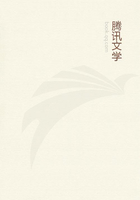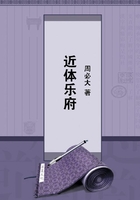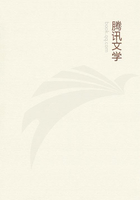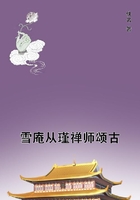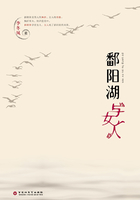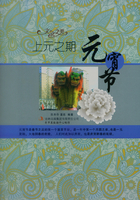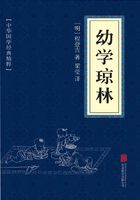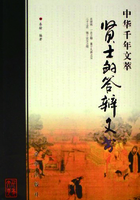Just is thy provident and pious thought;
For this by all the state thou art revered.
IPHIGENIA
Know'st thou what next I would?
THOAS
'Tis thine thy will To signify.
IPHIGENIA
Give for these strangers chains.
THOAS
To what place can they fly?
IPHIGENIA
A Grecian knows Naught faithful.
THOAS
Of my train go some for chains.
(Some attendants go out.)
IPHIGENIA
Let them lead forth the strangers.
THOAS
Be it so,IPHIGENIA
And veil their faces.
THOAS
From the sun's bright beams?
IPHIGENIA
Some of thy train send with me.
THOAS
These shall go,Attending thee.
IPHIGENIA
One to the city send.
THOAS
With what instructions charged?
IPHIGENIA
That all remain Within their houses.
THOAS
That the stain of blood They meet not?
IPHIGENIA
These things have pollution in them.
THOAS
Go thou,and bear the instructions.
(An attendant departs.)
IPHIGENIA
That none come In sight,THOAS
How wisely careful for the city!
IPHIGENIA
Warn our friends most.
THOAS
This speaks thy care for me.
IPHIGENIA
Stay thou before the shrine.
THOAS
To what intent?
IPHIGENIA
Cleanse it with lustral fires.
THOAS
That thy return May find it pure?
IPHIGENIA
But when the strangers come Forth from the temple.
THOAS
What must I then do?
IPHIGENIA
Spread o'er thine eyes a veil.
THOAS
That I receive not Pollution?
IPHIGENIA
Tedious if my stay appear.
THOAS
What bounds may be assign'd?
IPHIGENIA
Deem it not strange.
THOAS
At leisure what the rites require perform.
IPHIGENIA
May this lustration as I wish succeed!
THOAS
Thy wish is mine.
(ORESTES and PYLADES,bound,are led from the temple in solemn procession by the guards.THOAS and his retinue veil their heads as it slowly moves past.)
IPHIGENIA (chanting)
But from the temple,see,The strangers come,the sacred ornaments,The hallow'd lambs-for I with blood must wash This execrable blood away,-the light Of torches,and what else my rites require To purify these strangers to the goddess.
But to the natives of this land my voice Proclaims,from this pollution far remove,Art thou attendant at the shrine,who liftest Pure to the gods thy hands,or nuptial rites Dost thou prepare,or pregnant matron;hence,Begone,that this defilement none may touch.
Thou,daughter of Latona and high Jove,O royal virgin,if I cleanse the stain Of these,and where I ought with holy rites Address thee,thou shalt hold thy residence In a pure mansion;we too shall be bless'd.
More though I speak not,goddess,unexpress'd,All things to thee and to the gods are known.
(IPHIGENIA,carrying the statue,joins the procession as is goes out.THOAS and his retinue enter the temple.)
CHORUS (singing)
strophe Latona's glorious offspring claims the song,Born the hallow'd shades among,Where fruitful Delos winds her valleys low;Bright-hair'd Phoebus,skill'd to inspire Raptures,as he sweeps the lyre,And she that glories in the unerring bow.
From the rocky ridges steep,At whose feet the hush'd waves sleep,Left their far-famed native shore,Them the exulting mother bore To Parnassus,on whose heights Bacchus shouting holds his rites;Glittering in the burnish'd shade,By the laurel's branches made,Where the enormous dragon lies,Brass his scales,and flame his eyes,Earth-born monster,that around Rolling guards the oracular ground;Him,while yet a sportive child,In his mother's arms that smiled,Phoebus slew,and seized the shrine Whence proceeds the voice divine:
On the golden tripod placed,Throne by falsehood ne'er disgraced,Where Castalia's pure stream flows,He the fates to mortal shows.
antistrophe But when Themis,whom of yore Earth,her fruitful mother,bore,From her hallow'd seat he drove,Earth to avenge her daughter strove,Forming visions of the night,Which,in rapt dreams hovering light,All that Time's dark volumes hold Might to mortal sense unfold,When in midnight's sable shades Sleep the silent couch invades:
Thus did Earth her vengeance boast.
His prophetic honours lost,Royal Phoebus speeds his flight To Olympus,on whose height At the throne of Jove he stands,Stretching forth his little hands,Suppliant that the Pythian shrine Feel no more the wrath divine;That the goddess he appease;
That her nightly visions cease.
Jove with smiles beheld his son Early thus address his throne,Suing with ambitious pride O'er the rich shrine to preside;He,assenting,bow'd his head.
Straight the nightly visions fled;
And prophetic dreams no more Hover'd slumbering mortals o'er:
Now to Phoebus given again,All his honours pure remain;Votaries distant regions send His frequented throne to attend:
And the firm decrees of fate On his faithful voice await.
(A MESSENGER enters.)
MESSENGER
Say you,that keep the temple,and attend The altar,where is Thoas,Scythia's king?
Open these strong-compacted gates,and cal Forth from the shrine the monarch of the land.
LEADER OF THE CHORUS
Wherefore?at thy command if I must speak.
MESSENGER
The two young men are gone,through the device Of Agamemnon's daughter:from this land They fly;and,in their Grecian galley placed,The sacred image of the goddess bear.
LEADER
Incredible thy tale:but whom thou seek'st,The monarch,from the temple went in haste.
MESSENGER
Whither?for what is doing he should know.
LEADER
We know not:but go thou,and seek for him:
Where'er thou find him,thou wilt tell him this.
MESSENGER
See,what a faithless race you women are!
In all that hath been done you have a part.
LEADER
Sure thou art mad!what with the strangers'flight Have we to do?But wilt thou not,with all The speed thou mayst,go to the monarch's house?
MESSENGER
Not till I first am well inform'd,if here Within the temple be the king,or not.
(Shouting)
Unbar the gates (to you within I speak);
And tell your lord that at the portal here I stand,and bring him tidings of fresh ills.
(THOAS and his attendants enter from the temple.)
THOAS
Who at the temple of the goddess dares This clamour raise,and,thundering at the gates,Strikes terror through the ample space within?
MESSENGER

